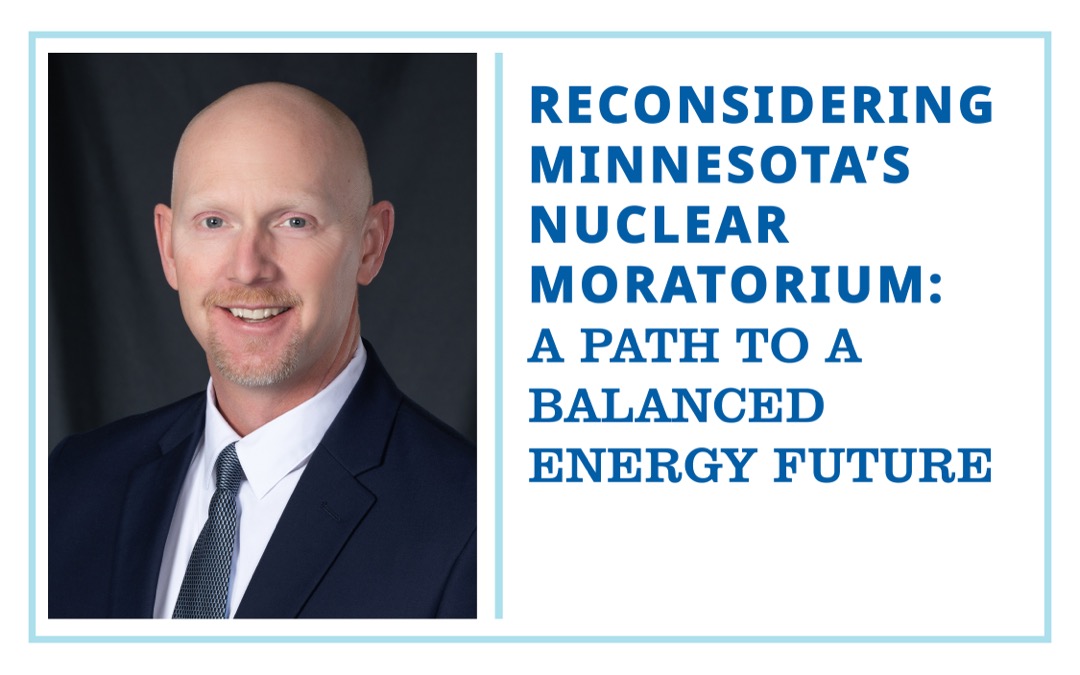As Minnesota works toward a cleaner energy future, it’s important to evaluate all potential power sources that can provide both reliability and sustainability. As the state moves toward its goal of 100% carbon-free electricity by 2040, discussions about the role of nuclear power have resurfaced.
Currently, Minnesota has a moratorium on constructing new nuclear power plants, a policy that has been in place since 1994. However, with advances in technology and the growing need for reliable, carbon-free energy, it may be time to reconsider this restriction.
A Legislative Priority for MN’s Energy Future
Lawmakers in both the House and Senate are considering bills that would allow for the exploration of new nuclear technologies, including Small Modular Reactors. These discussions are a critical step in determining whether nuclear energy can play a responsible and beneficial role in Minnesota’s long-term energy strategy.
State legislators are actively engaging with industry experts, cooperative leaders, and energy stakeholders to evaluate nuclear power’s potential contributions to a carbon-free future.
Why is Nuclear Energy Part of the Discussion?
Minnesota’s commitment to a carbon-free future means reducing reliance on fossil fuels while ensuring a steady, dependable power supply. 08-25-101 While wind and solar energy have made significant contributions to the state’s energy mix, these sources are intermittent meaning they only generate electricity when the wind blows or the sun shines.
Nuclear energy, on the other hand, provides consistent and reliable baseload power. Unlike renewables, nuclear plants operate around the clock, helping to stabilize the grid and ensuring that electricity is available when it’s needed most. This reliability is especially important in Minnesota, where extreme temperatures place high demands on the energy system.
The Advancements in Nuclear Technology
In the past, concerns about nuclear energy centered around safety, spent fuel disposal, and high costs. However, advancements in nuclear technology have addressed many of these issues. One of the most promising developments is Small Modular Reactors, a new generation of nuclear reactors designed to be safer, more efficient, and more adaptable to a modern energy grid.
Small Modular Reactors have several advantages:
- Enhanced Safety – New reactor designs have built-in safety features that significantly reduce the risk of and potential for accidents.
- Smaller Footprint – Small Modular Reactors take up less space than traditional nuclear plants, making them easier to integrate into existing infrastructure.
- Scalability – These reactors can be built in stages, allowing utilities to expand capacity as needed.
- Reduced Waste – Advances in fuel technology mean that Small Modular Reactors produce less nuclear spent fuel compared to older reactors.
Lifting the moratorium could allow Minnesota to explore these next-generation technologies and work to incorporate them into the state’s long-term energy strategy.
Balancing Reliability and Sustainability
As Minnesota works toward a cleaner energy future, it’s important to balance environmental goals with the need for affordability and reliability. Large-scale hydroelectricity and carbon capture have also been proposed as part of the solution, but nuclear energy remains one of the few options that can provide steady, emissions-free power.
Other states and countries are already investing in nuclear as part of their carbon reduction plans. By lifting the moratorium, Minnesota would have the opportunity to study and consider nuclear energy’s potential, rather than excluding it outright.
An Opportunity for Thoughtful Discussion
Lifting the nuclear moratorium does not mean Minnesota will immediately build new nuclear plants. Rather, it opens the door for further study, discussion, and careful planning. At the heart of this conversation is a simple question: How can Minnesota achieve its carbon-free goals while maintaining a reliable and affordable power grid? By keeping all options on the table—including nuclear—we can make informed decisions that benefit all Minnesotans.
Minnesota’s energy future will require innovation, collaboration, and careful planning. Revisiting the nuclear moratorium is one step toward ensuring that future generations have access to safe, reliable, affordable and sustainable power.

